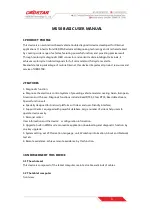
47
11. CEPHALOMETRIC EXPOSURE
This section will occasionally use procedures described in previous sections. Please
refer to those sections when needed.
This procedure will produce a cephalometric exposure as selected:
-
PA
-
Waters PA
-
AP
-
Lateral
-
Basal-Hirtz axial
-
45 degrees
-
Carpal
ATTENTION
BEFORE START, OPEN THE HEAD POSITIONER AND
REMOVE THE CHIN REST AND BITE GUIDE FROM THE
PATIENT SUPPORT.
Select the correct exposure parameters in accordance with the patient
characteristics. The table below gives the suggested parameters. Please use these values for
reference only. If necessary, adjust the values according to your needs.
Patient Size and
Age
kV – DIGITAL VERSION
Child Adult
Small 60kV
70kV
Medium 65kV
75kV
Large 70kV
80kV
ATTENTION
IF THE REQUIRED DIAGNOSTIC VALUE CAN BE REACHED
WITH LOWER VALUES THAN THE ABOVE TABLE
INDICATES, YOU SHOULD USE THOSE LOWER VALUES.
ALWAYS TRY TO MINIMIZE THE RADIATION DOSE TO THE
PATIENT.
11.1. GETTING THE SOFTWARE READY
Enter Imaging Software and be sure that the green light is on indicating that the sensor
is ready. Refer to previous sections for assistance if required.
Summary of Contents for EAGLE
Page 1: ...USER S MANUAL...
Page 2: ...1 THIS PAGE WAS INTENTIONALLY LEFT BLANK...
Page 7: ...6 2 SYMBOLS Use the icons below to identify the symbols on your equipment...
Page 65: ...64...
Page 66: ...65...
Page 67: ...66...
Page 74: ...73 16 12 CHARACTERISTIC CURVES OF THE X RAY TUBE Exposition Time...
Page 75: ...74 17 LABELS OF IDENTIFICATION 17 1 PACKAGE...
Page 76: ...75 17 2 PRODUCT...
Page 77: ...76 18 EQUIPMENT DIMENSIONS...
















































